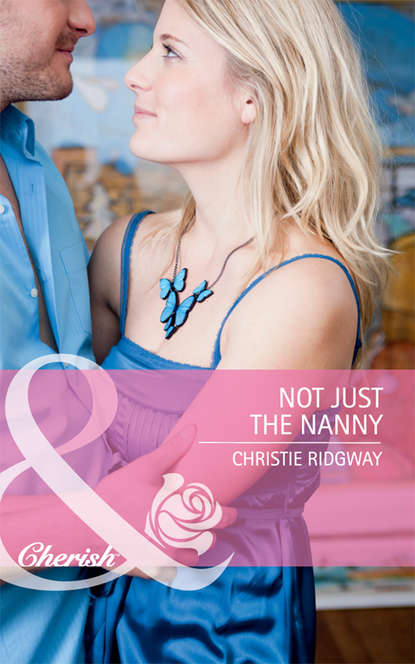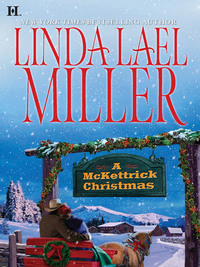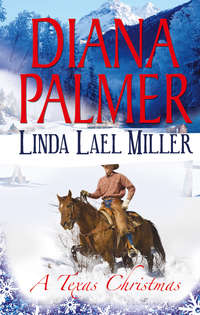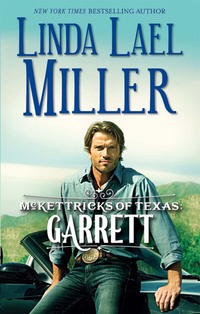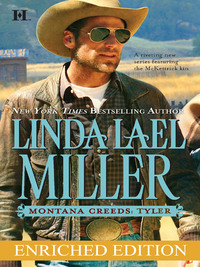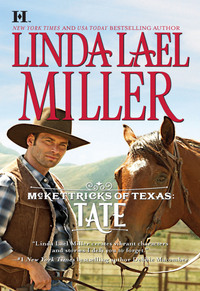
Полная версия
Sierra's Homecoming
“How do you like it? The ranch house, I mean?”
“I haven’t seen much of it,” Sierra answered. “Liam and I just got here, and then we had lunch….” Her hand went, of its own accord, to the teapot, and she imagined she felt just the faintest charge when she touched it. “Lots of antiques around here,” she said, thinking aloud.
“Don’t be afraid to use them,” Meg replied. “Family tradition.”
Sierra withdrew her hand from the teapot, shut the doors. “Family tradition?”
“McKettrick rules,” Meg said, with a smile in her voice. “Things are meant to be used, no matter how old they are.”
Sierra frowned, uneasy. “But if they get broken—”
“They get broken,” Meg finished for her. “Have you met Travis yet?”
“Yes,” Sierra said. “And he’s not at all what I expected.”
Meg laughed. “What did you expect?”
“Some gimpy old guy, I guess,” Sierra admitted, warming to the friendliness in her sister’s voice. “You said he took care of the place and lived in a trailer by the barn, so I thought—” She broke off, feeling foolish.
“He’s cute and he’s single,” Meg said.
“Even the teapot?” Sierra mused.
“Huh?”
Sierra put a hand to her forehead. Sighed. “Sorry. I guess I missed a segue there. There’s a teapot in the china cabinet in the kitchen—I was just wondering if I could—”
“I know the one,” Meg answered, with a soft fondness in her voice. “It was Lorelei’s. She got it for a wedding present.”
Lorelei. The matriarch of the family. Sierra took a step backward.
“Use it,” Meg said, as if she’d seen Sierra’s reflexive retreat.
Sierra shook her head. “I couldn’t. I had no idea it was that old. If I dropped it—”
“Sierra,” Meg said, “it’s not china. It’s cast iron, with an enamel overlay.”
“Oh.”
“Kind of like the McKettrick women, Mom always says.” Meg went on. “Smooth on the outside, tough as iron on the inside.”
Mom. Sierra closed her eyes against all the conflicting emotions the word brought up in her, but it didn’t help.
“We’ll give you time to settle in,” Meg said gently, when Sierra was too choked up to speak. “Then Mom and I will probably pop in for a visit. If that’s okay with you, of course.”
Both Meg and Eve lived in San Antonio, Texas, where they helped run McKettrickCo, a multinational corporation with interests in everything from software to communication satellites, so they wouldn’t be “popping in” without a little notice.
Sierra swallowed hard. “It’s your house,” she said.
“And yours,” Meg pointed out, very quietly.
After that, Meg made Sierra promise to call if she needed anything. They said goodbye, and the call ended.
Sierra went back to the china cabinet for the teapot.
Liam clattered down the back stairs. “I told you this place was haunted!” he crowed, his small face shining with delight.
The teapot was heavy—definitely cast iron—but Sierra was careful as she set it on the counter, just the same. “What on earth are you talking about?”
“I just saw a kid,” Liam announced. “Upstairs, in my room!”
“You’re imagining things.”
Liam shook his head. “I saw him!”
Sierra approached her son, laid her hand to his forehead. “No fever,” she mused, worried.
“Mom,” Liam protested, pulling back. “I’m not sick—and I’m not delusional, either.”
Delusional. How many seven-year-olds used that word? Sierra sighed and cupped Liam’s eager face in both hands. “Listen. It’s fine to have imaginary friends, but—”
“He’s not imaginary.”
“Okay,” Sierra responded, with another sigh. It was possible, she supposed, that a neighbor child had wandered in before they arrived, but that seemed unlikely, given that the only other houses on the ranch were miles away. “Let’s investigate.”
Together they climbed the back stairs, and Sierra got her first look at the upper story. The corridor was wide, with the same serviceable board floors. The light fixtures, though old-fashioned, were electric, but most of the light came from the large arched window at the far end of the hallway. Six doors stood open, an indication that Liam had visited each room in turn after leaving the kitchen the first time.
He led her into the middle one, on the left side.
No one was there.
Sierra let out her breath, admiring the room. It was spacious, perfect quarters for a boy. Two bay windows overlooked the barn area, where Baldy, the singularly unattractive horse, stood stalwartly in the middle of the corral, looking as though he intended to break loose at any second and do some serious bucking. Travis was beside Baldy, stroking the animal’s neck as he eased the halter off over its head.
A quivery sensation tickled the pit of Sierra’s stomach.
“Mom,” Liam said. “He was here. He had on short pants and funny shoes and suspenders.”
Sierra turned to look at her son, feeling fretful again. Liam stood near the other window, examining an antique telescope, balanced atop a shining brass tripod. “I believe you,” she said.
“You don’t,” Liam argued, jutting out his chin. “You’re humoring me.”
Sierra sat down on the side of the bed positioned between the windows. Like the dressers, it was scarred with age, but made of sturdy wood. The headboard was simply but intricately carved, and a faded quilt provided color. “Maybe I am, a little,” she admitted, because there was no fooling Liam. He had an uncanny knack for seeing through anything but the stark truth. “I don’t know what to think, that’s all.”
“Don’t you believe in ghosts?”
I don’t believe in much of anything, Sierra thought sadly. “I believe in you,” she said, patting the mattress beside her. “Come and sit down.”
Reluctantly, he sat. Stiffened when she slipped an arm around his shoulders. “If you think I’m going to take a nap,” he said, “you’re dead wrong.”
The word dead tiptoed up Sierra’s spine to dance lightly at her nape. “Everything’s going to be all right, you know,” she said gently.
“I like this room,” Liam confided, and the hopeful uncertainty in his manner made Sierra’s heart ache. They’d always lived in apartments or cheap motel rooms. Had Liam been secretly yearning to call a house like this one home? To settle down somewhere and live like a normal kid?
“Me, too,” Sierra said. “It has friendly vibes.”
“Is that supposed to be like a closet?” Liam asked, indicating the huge pine armoire taking up most of one wall.
Sierra nodded. “It’s called a wardrobe.”
“Maybe it’s like the one in that story. Maybe the back of it opens into another world. There could be a lion and a witch in there.” From the smile on Liam’s face, the concept intrigued rather than troubled him.
She ruffled his hair. “Maybe,” she agreed.
His attention shifted back to the telescope. “I wish I could look through that and see Andromeda,” he said. “Did you know that the whole galaxy is on a collision course with the Milky Way? All hell’s going to break loose when it gets here, too.”
Sierra shuddered at the thought. Most parents worried that their kids played too many video games. With Liam, the concern was the Discovery and Science Channels, not to mention programs like Nova. He thought about things like Earth losing its magnetic field and had nightmares about creatures swimming in dark oceans under the ice covering one of Jupiter’s moons. Or was it Saturn?
“Don’t get excited, Mom,” he said, with an understanding smile. “It’s going to be something like five billion years before it happens.”
“Before what happens?” Sierra asked, blinking.
“The collision,” he said tolerantly.
“Right,” Sierra said.
Liam yawned. “Maybe I will take a nap.” He studied her. “Just don’t get the idea it’s going to be a regular thing.”
She mussed his hair again, kissed the top of his head. “I’m clear on that,” she said, standing and reaching for the crocheted afghan lying neatly folded at the foot of the bed.
Liam kicked off his shoes and stretched out on top of the blue chenille bedspread, yawning again. He set his glasses on the night stand with care.
She covered him, resisted the temptation to kiss his forehead, and headed for the door. When she looked back from the threshold, Liam was already asleep.
1919
Hannah McKettrick heard her son’s laughter before she rode around the side of the house, toward the barn, a week’s worth of mail bulging in the saddlebags draped across the mule’s neck. The snow was deep, with a hard crust, and the January wind was brisk.
Her jaw tightened when she saw her boy out in the cold, wearing a thin jacket and no hat. He and Doss, her brother-in-law, were building what appeared to be a snow fort, their breath making white plumes in the frigid air.
Something in Hannah gave a painful wrench at the sight of Doss; his resemblance to Gabe, his brother and her late husband, invariably startled her, even though they lived under the same roof and she should have been used to him by then.
She nudged the mule with the heels of her boots, but Seesaw-Two didn’t pick up his pace. He just plodded along.
“What are you doing out here?” Hannah called.
Both Tobias and Doss fell silent, turning to gaze guiltily in her direction.
The breath plumes dissipated.
Tobias set his feet and pushed back his narrow shoulders. He was only eight, but since Gabe’s coffin had arrived by train one warm day last summer, draped in an American flag and with Doss for an escort, her boy had taken on the mien of a man.
“We’re just making a fort, Ma,” he said.
Hannah blinked back sudden, stinging tears. A soldier, Gabe had died of influenza in an army infirmary, without ever seeing the battleground. Tobias thought in military terms, and Doss encouraged him, a fact Hannah did not appreciate.
“It’s cold out here,” she said. “You’ll catch your death.”
Doss shifted, pushed his battered hat to the back of his head. His face hardened, like the ice on the pond back of the orchard where the fruit trees stood, bare-limbed and stoic, waiting for spring.
“Go inside,” Hannah told her son.
Tobias hesitated, then obeyed.
Doss remained, watching her.
The kitchen door slammed eloquently.
“You’ve got no business putting thoughts like that in his head,” Doss said, in a quiet voice. He took old Seesaw’s reins and held him while she dismounted, careful to keep her woolen skirts from riding up.
“That’s a fine bit of hypocrisy, coming from you,” Hannah replied. “Tobias had pneumonia last fall. We nearly lost him. He’s fragile, and you know it, and as soon as I turn my back, you have him outside, building a snow fort!”
Doss reached for the saddlebags, and so did Hannah. There was a brief tug-of-war before she let go. “He’s a kid,” Doss said. “If you had your way, he’d never do anything but look through that telescope and play checkers!”
Hannah felt as warm as if she were standing close to a hot stove, instead of Doss McKettrick. Their breaths melded between them. “I fully intend to have my way,” she said. “Tobias is my son, and I will not have you telling me how to raise him!”
Doss slapped the saddlebags over one shoulder and stepped back, his hazel eyes narrowed. “He’s my nephew—my brother’s boy—and I’ll be damned if I’ll let you turn him into a sickly little whelp hitched to your apron strings!”
Hannah stiffened. “You’ve said quite enough,” she told him tersely.
He leaned in, so his nose was almost touching hers. “I haven’t said the half of it, Mrs. McKettrick.”
Hannah sidestepped him, marching for the house, but the snow came almost to her knees and made it hard to storm off in high dudgeon. Her breath trailed over her right shoulder, along with her words. “Supper’s in an hour,” she said, without turning around. “But maybe you’d rather eat in the bunkhouse.”
Doss’s chuckle riled her, just as it was no doubt meant to do. “Old Charlie’s a sight easier to get along with than you are, but he can’t hold a candle to you when it comes to home cooking. Anyhow, he’s been gone for a month, in case you haven’t noticed.”
She felt a flush rise up her neck, even though she was shivering inside Gabe’s old woolen work coat. His scent was fading from the fabric, and she wished she knew a way to hold on to it.
“Suit yourself,” she retorted.
Tobias shoved a chunk of wood into the cookstove as she entered the house, sending sparks snapping up the gleaming black chimney before he shut the door with a clang.
“We were only building a fort,” he grumbled.
Hannah was stilled by the sight of him, just as if somebody had thrown a lasso around her middle and pulled it tight. “I could make biscuits and sausage gravy,” she offered quietly.
Tobias ignored the olive branch. “You rode down to the road to meet the mail wagon,” he said, without meeting her eyes. “Did I get any letters?” With his hands shoved into the pockets of his trousers and his brownish-blond hair shining in the wintry sunlight flowing in through the windows, he looked the way Gabe must have, at his age.
“One from your grandpa,” Hannah said. Methodically, she hung her hat on the usual peg, pulled off her knitted mittens and stuffed them into the pockets of Gabe’s coat. She took that off last, always hating to part with it.
“Which grandpa?” Tobias lingered by the stove, warming his hands, still refusing to glance her way.
Hannah’s family lived in Missoula, Montana, in a big house on a tree-lined residential street. She missed them sorely, and it hurt a little, knowing Tobias was hoping it was Holt who’d written to him, not her father.
“The McKettrick one,” she said.
“Good,” Tobias answered.
The back door opened, and Doss came in, still carrying the saddlebags. Usually he stopped outside to kick the snow off his boots so the floors wouldn’t get muddy, but today he was in an obstinate mood.
Hannah went to the stove and ladled hot water out of the reservoir into a basin, so she could wash up before starting supper.
“Catch,” Doss said cheerfully.
She looked back, saw the saddlebags, burdened with mail, fly through the air. Tobias caught them ably with a grin.
When was the last time he’d smiled at her that way?
The boy plundered anxiously through the bags, brought out the fat envelope postmarked San Antonio, Texas. Her in-laws, Holt and Lorelei McKettrick, owned a ranch outside that distant city, and though the Triple M was still home to them, they’d been spending a lot of time away since the beginning of the war. Hannah barely knew them, and neither did Tobias, for that matter, but they’d kept up a lively correspondence, the three of them, ever since he’d learned to read, and the letters had been arriving on a weekly basis since Gabe died.
Gabe’s folks had come back for the funeral, of course, and in the intervening months Hannah had been secretly afraid. Holt and Lorelei saw their lost son in Tobias, the same as she did, and they’d offered to take him back to Texas with them when they left. She hadn’t had to refuse—Tobias had done that for her, but he’d clearly been torn. A part of him had wanted to leave.
Hannah’s heart had wedged itself up into her throat and stayed there until Gabe’s mother and father were gone. Whenever a letter arrived, she felt anxious again.
She glanced at Doss, now shrugging out of his coat. He’d gone away to the army with Gabe, fallen sick with influenza himself, recovered and stayed on at the ranch after he brought his brother’s body home for burial. Though no one had come right out and said so, Hannah knew Doss had remained on the Triple M, instead of joining the folks in Texas, mainly to look after Tobias.
Maybe the McKettricks thought she’d hightail it home to Montana, once she got over the shock of losing Gabe, and they’d lose track of the boy.
Now Tobias stood poring over the letter, devouring every word with his eyes, getting to the last page and starting all over again at the beginning.
Deliberately Hannah diverted her attention, and that was when she saw the teapot, sitting on the counter. She looked toward the china cabinet, across the room. She hadn’t touched the piece, knowing it was special to Lorelei, and she couldn’t credit that Doss or Tobias would have taken it from its place, either. They’d been playing in the snow while she was gone to fetch the mail, not throwing a tea party.
“Did one of you get this out?” she asked casually, getting a good grip on the pot before carrying it back to the cabinet. It was made of metal, but the pretty enamel coating could have been chipped, and Hannah wasn’t about to take the risk.
Tobias barely glanced her way before shaking his head. He was still intent on the letter from Texas.
Doss looked more closely, his gaze rising curiously from the teapot to Hannah’s face. “Nope,” he said at last, and busied himself emptying the contents of the coffeepot down the sink before pumping in water for a fresh batch.
Hannah closed the doors of the china cabinet, frowning.
“Odd,” she said, very softly.
Chapter Three
Present Day
Sierra descended the rear staircase into the kitchen, being extra quiet so she wouldn’t wake Liam up. He hadn’t had an asthma attack in almost a month, but he needed his rest.
Intending to brew herself some tea and spend a few quiet minutes restoring her equilibrium, she chose a mug from one of the cupboards, located a box of orange pekoe, and reached for the heirloom teapot.
It was gone.
She glanced toward the china cabinet and saw Lorelei’s teapot sitting behind the glass.
Jesse or Travis must have come inside while she was upstairs, she reasoned, and put it away.
But that seemed unlikely. Men, especially cowboys, didn’t usually fuss with teapots, did they? Not that she knew that much about men in general or cowboys in particular.
She’d seen Travis earlier, from Liam’s bedroom window, working with the horse, and she was sure he hadn’t been back in the house after carrying in the bags.
“Jesse?” she called softly, half-afraid he might jump out at her from somewhere.
No answer.
She moved to the front of the house, peered between the lace curtains in the parlor. Jesse’s truck was gone, leaving deep tracks in the patchy mud and snow, rapidly filling with gossamer white flakes.
Bemused, Sierra returned to the kitchen, grabbed her coat and went out the back door, shoving her hands into her pockets and ducking her head against the thickening snowfall and the icy wind that accompanied it. Nothing in her life had prepared her for high-country weather; she’d been raised in Mexico, moved to San Diego after her father died and spent the last several years living in Florida. She supposed it would be a while before she adjusted to the change in climate, but if there was one thing she’d learned to do, on the long journey from then to now, it was adapt.
The doors of the big, weathered-board barn stood open, and Sierra stepped inside, shivering. It was warmer there, but she could still see her breath.
“Mr. Reid?”
“Travis,” came the taciturn answer from a nearby stall. “I don’t answer to much of anything else.”
Sierra crossed the sawdust floor and saw Travis on the other side of the door, grooming poor old Baldy with long, gentle strokes of a brush. He gave her a sidelong glance and grinned slightly.
“Settling in okay?” he asked.
“I guess,” she said, leaning on the stall door to watch him work. There was something soothing about the way he attended to that horse, almost as though he were touching her own skin….
Perish the thought.
He straightened. A quiver went through Baldy’s body. “Something wrong?” Travis asked.
“No,” Sierra said quickly, attempting a smile. “I was just wondering…”
“What?” Travis went back to brushing again, though he was still watching Sierra, and the horse gave a contented little snort of pleasure.
Suddenly the whole subject of the teapot seemed silly. How could she ask if he or Jesse had moved it? And, so what if they had? Jesse was a McKettrick, born and raised, and the things in that house were as much a part of his heritage as hers. Travis was clearly a trusted family friend—if not more.
Sierra found that possibility unaccountably disturbing. Meg had said he was single and free, but she obviously trusted Travis implicitly, which might mean there was a deeper level to their relationship.
“I was just wondering…if you ever drink tea,” Sierra hedged lamely.
Travis chuckled. “Not often, unless it’s the electric variety,” he replied, and though he was smiling, the expression in his eyes was one of puzzlement. He was probably asking himself what kind of nut case Meg and Eve had saddled him with. “Are you inviting me?”
Sierra blushed, even more self-conscious than before. “Well…yes. Yes, I guess so.”
“I’d rather have coffee,” Travis said, “if that’s all right with you.”
“I’ll put a pot on,” Sierra answered, foolishly relieved. She should have walked away, but she seemed fixed to the spot, as though someone had smeared the soles of her shoes with superglue.
Travis finished brushing down the horse, ran a gloved hand along the animal’s neck and waited politely for Sierra to move, so he could open the stall door and step out.
“What’s really going on here, Ms. McKettrick?” he asked, when they were facing each other in the wide aisle, Baldy’s stall door securely latched. Along the aisle, other horses nickered, probably wanting Travis’s attention for themselves.
“Sierra,” she said. She tried to sound friendly, but it was forced.
“Sierra, then. Somehow I don’t think you came out here to ask me to a tea party or a coffee klatch.”
She huffed out a breath and pushed her hands deeper into her coat pockets. “Okay,” she admitted. “I wanted to know if you or Jesse had been inside the house since you brought the baggage in.”
“No,” Travis answered readily.
“It would certainly be all right if you had, of course—”
Travis took a light grip on Sierra’s elbow and steered her toward the barn doors. He closed and fastened them once they were outside.
“Jesse got in his truck and left, first thing,” he said. “I’ve been with Baldy for the last half an hour. Why?”
Sierra wished she’d never begun this conversation. Never left the warmth of the kitchen for the cold and the questions in Travis’s eyes. She’d done both those things, though, and now she would have to explain. “I took a teapot out of the china cabinet,” she said, “and set it on the counter. I went up to Liam’s room, to help him settle in for a nap, and when I came downstairs—”
A startling grin broke over Travis’s features like a flash of summer sunlight over a crystal-clear pond. “What?” he prompted. He moved to Sierra’s other side, shielding her from the bitter wind, increasing his pace, and therefore hers, as they approached the house.
“It was in the cabinet again. I would swear I put it on the counter.”
“Weird,” Travis said, kicking the snow off his boots at the base of the back steps.
Sierra stepped inside, shivering, took off her coat and hung it up.
Travis followed, closed the door, pulled off his gloves and stuffed them into the pockets of his coat before hanging it beside Sierra’s, along with his hat. “Must have been Liam,” he said.
“He’s asleep,” Sierra replied. The coffee she’d made earlier was still hot, so she filled two mugs, casting an uneasy glance toward the china cabinet as she did so. Liam couldn’t have gotten downstairs without her seeing him, and even if he had, he wouldn’t have been able to reach the high shelf in the china closet without dragging a chair over. She would have heard the scraping sound and, anyway, Liam being Liam, he wouldn’t have put the chair back where he found it. There would have been evidence.
Travis accepted the cup Sierra offered with a nod of thanks, took a sip. “You must have put it away yourself, then,” he said reasonably. “And then forgotten.”


